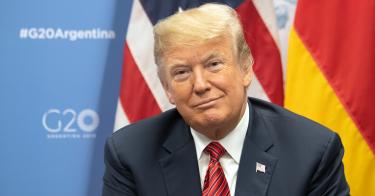Argentina, host of this weekend’s G-20 summit meeting, styles itself as a global leader. So do many other nations that will attend. Yet they will join in issuing a call from Buenos Aires for “fair and sustainable” international development, despite being very poor economic role models for the rest of the world.
If hosting countries were selected according to their rank in The Heritage Foundation’s annual Index of Economic Freedom, Argentina would not have made the cut. Nor would the so-called G-20 “BRIC” countries (Brazil, Russia, India, and China). All of them are mostly unfree and ended up in the bottom half.
President Trump and the heads of state from G-20 countries with better economic freedom scores, such as Australia, the UK, Canada, Germany, South Korea, and Japan, should unite to put economic freedom policies at the forefront of the agenda in Buenos Aires. They should resolve to hold the G-20 laggards accountable to improve their performance — with the threat that they will be dropped from future meetings of this exclusive club.
That would mean having serious discussions in Buenos Aires about the main reasons for their poor showings.
For example, the investment profile of this year’s G-20 host declined steadily from 2001 to 2015 during the presidencies of Cristina Fernández de Kirchner and her late husband Néstor. Their legacy of statist protectionism and other Peronist policies isolated Argentina and led to economic stagnation.
Center-right President Mauricio Macri has been trying to implement a reformist agenda. But he has been stymied by the Peronist opposition-controlled Congress, weaker commodity prices, and a downturn in foreign investment.
Nevertheless, Macri is sticking with his government’s politically difficult program of budget cuts and tax increases to close the fiscal gap. Other unpopular measures include the continued unwinding of costly energy subsidies, which caused prices of regulated goods and services to rise and spiked inflation.
If Macri can succeed in restoring fiscal health, however, he will be well positioned to improve government integrity. He can also make the many other institutional and structural reforms needed to restore Argentina to its former levels of economic freedom.
Next door, Brazil’s bloated and overly centralized federal government has been crushing economic freedom for decades. Public corruption has led to political chaos. In 2018, former President Luiz Inácio “Lula” da Silva of the socialist Workers’ Party went to prison on corruption charges. His successor, Dilma Rousseff, was removed from office in 2016 for budgetary misconduct. And her successor, market-oriented centrist Michel Temer, was also tainted by corruption.
Fortunately, across South America there is a continent-wide and sweeping pivot underway away from long-discredited Communist/socialist economic theories and back to market-based democracy. That movement towards expanded economic freedom received a dramatic boost in 2018. Voters in Brazil, disgusted and angered by the disastrous consequences of more than a decade of socialism, decisively rejected the Workers’ Party in favor of a relatively unknown presidential candidate, Jair Bolsonaro, who was untainted by corruption and who campaigned to restore the rule of law and individual liberty, in part by privatizing corrupt (and corrupting) state-owned enterprises.
Meanwhile, Colombian voters elected a young center-right candidate, Iván Duque, who is a protégé of free-market former President Alvaro Uribe. Even Ecuador, under President Lenín Moreno, has become more centrist and retreated from the populist policies of ex-President Rafael Correa.
The election in recent years of pro-market, center-right candidates to the presidencies of major Latin American countries such as Argentina, Brazil, Chile and Colombia, however, may finally generate enough momentum to surmount the region’s historical tendency to revert to the authoritarian cronyism that has held back development in Latin America.
Still, the foundations of a well-functioning free market in many Latin American countries remain shallow, with widespread corruption and the weak protection of property rights aggravating systemic shortcomings such as regulatory inefficiency and monetary instability caused by various government-driven market distortions.
Similar obstacles to economic freedom exist in China, Russia, and many other countries.
For his part, President Trump should take the lead at the G-20 toward greater economic freedom by exhorting his fellow heads of state to mimic his successful tax cuts and regulatory reforms that have spurred economic growth in the United States since he took office. He should also take a step to reverse course on protectionism by signing the U.S.-Mexico-Canada (USMCA) free trade agreement on Nov. 30 in Buenos Aires.
Trump can also assure other U.S. trading partners in Asia and Europe of his administration’s intention to negotiate agreements to open markets and reduce tariff and non-tariff barriers.
The free and mostly free G-20 countries should insist that future G-20 summit meetings be scheduled only in countries that are at least “mostly free.” That will mean insisting upon a change of venue for the scheduled 2020 G-20 Summit in Saudi Arabia, another G-20 “mostly unfree” country.
By exerting such leadership, economically free countries at the G-20 Summit can begin to reverse stagnant and often eroding scores on economic freedom in too many of the nations of the world and open a new pathway towards greater global prosperity.
This piece originally appeared in The Daily Caller on 11/29/18



